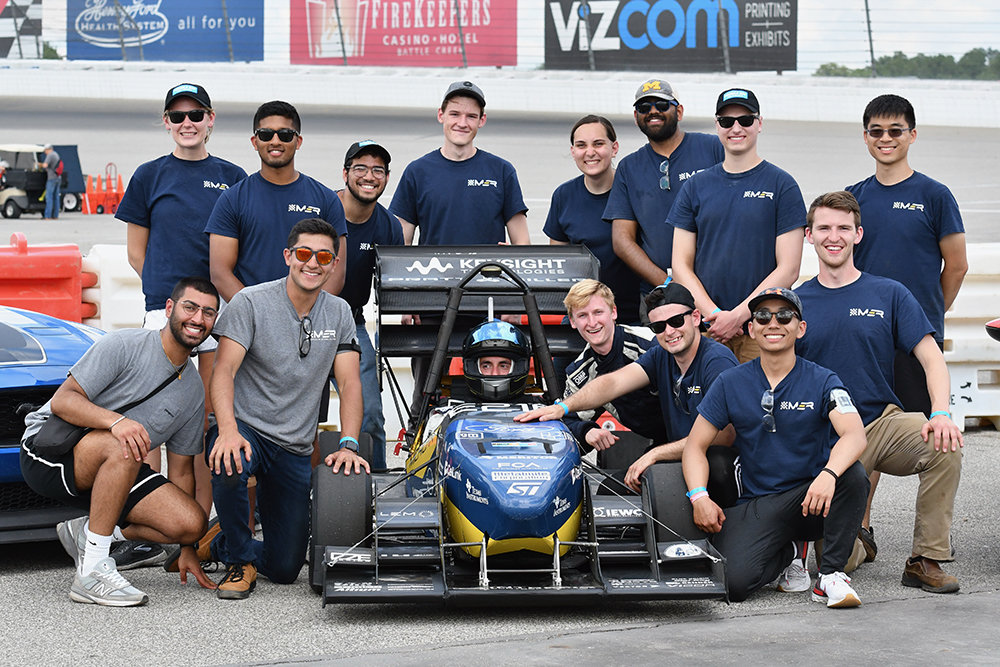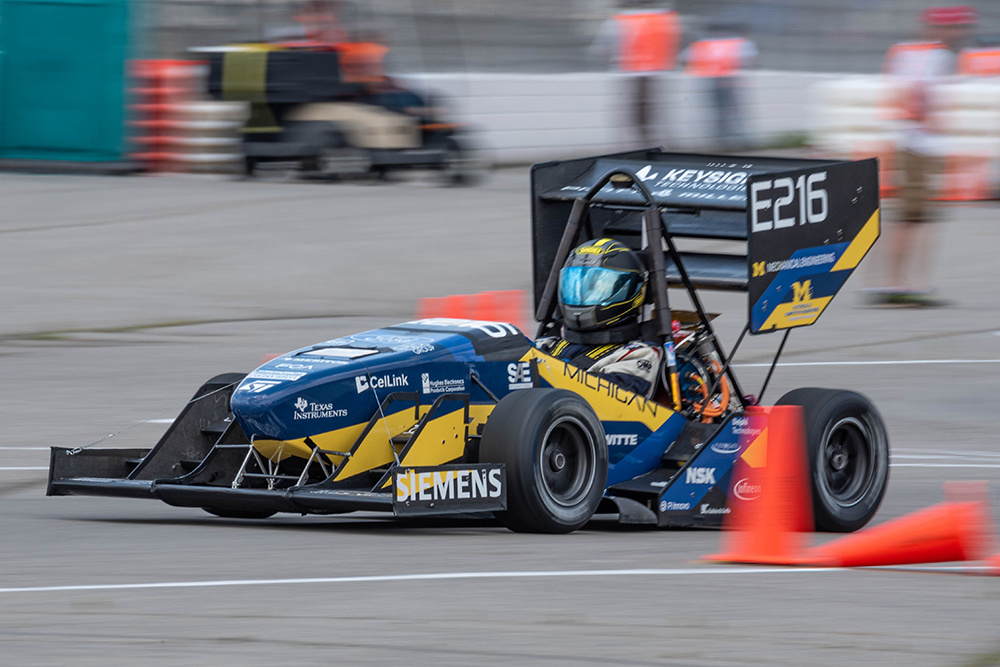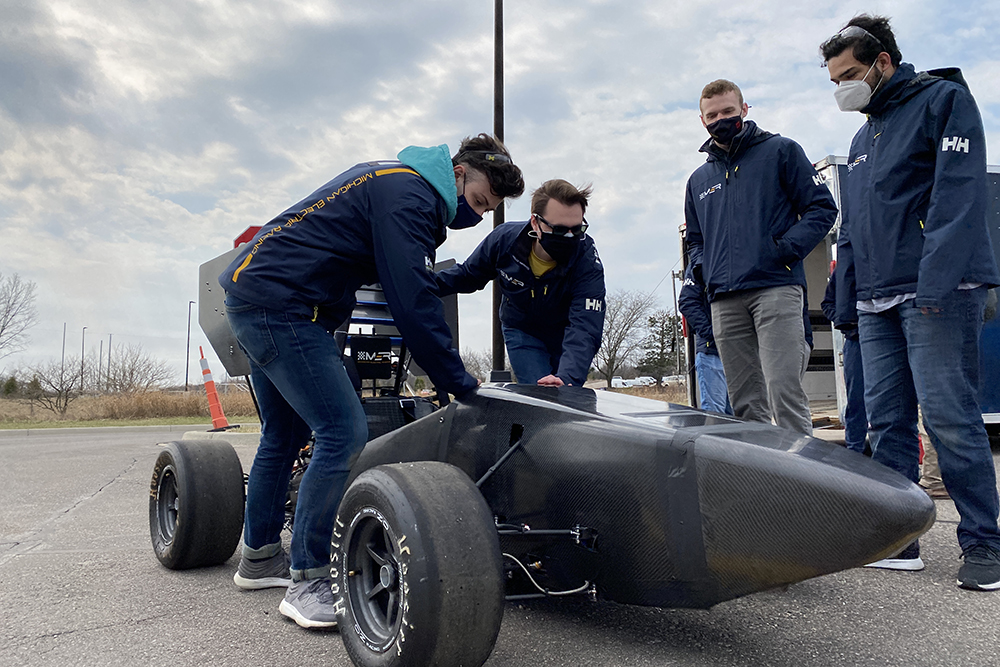
Michigan Electric Racing takes first place at Formula SAE Michigan
The student team overcame a year of pandemic-related challenges and completed a near perfect sweep of the Electric Vehicle Class events.

The student team overcame a year of pandemic-related challenges and completed a near perfect sweep of the Electric Vehicle Class events.

In their first competition since the pandemic shut everything down, Michigan Electric Racing (MER) was crowned champion of the Electric Vehicle Class at Formula SAE Michigan. The team completed a near perfect sweep of the events, finishing first place in Skidpad, Acceleration, Autocross, and Efficiency, and second place for Endurance.
“I’m very impressed with my teammates for overcoming all these challenges,” says Madeleine Bahorski, an Electrical Engineering senior who served as the low voltage lead on the team. “It was really hard to have a vision for the future when the future was so uncertain.”
Shortly before the team was due to begin competition in 2020, the pandemic shut down all events and forced the university to shift to a completely remote schedule. For the entire summer, the team was locked out of the Wilson Center, where they construct their car.
“It was quite rough,” says Kanisius Kusumadjaja, a Computer Engineering senior who served as the powertrain lead. “You can only do so much without access to the car. Our work was pretty slow, and without in person meetings, it felt like some of the team aspect was gone.”

“From the leadership perspective, there were a lot of questions like, what are we going to do now? How are we going to carry the spirit of this team? How are we going to continue the pursuit of excellence?” Bahorski says.
One of the biggest challenges was the loss of seniors who’d designed the 2020 car. Typically, the seniors attend competition and help train the new leads, but without competition and without in-person workshop sessions, some of the typical knowledge transfer was lost. This was made more difficult because the team was unable to test the designs on an actual car – everything was limited to simulation.
“As a team leader, onboarding new people took a lot more time and energy from me,” Bahorski says. “I set up Google meets to talk to each new person about the project that they were working on and review their code. Other leaders did the same thing, and it definitely helped me get a more holistic picture of the nitty gritty of each project.”
The team gained limited access to the center in the fall under strict social distancing guidelines, with only a few members allowed into the space at a time. Normally, the center is open 24/7, and it’s not uncommon for at least a few members to be present in the work station at all times. This past year, however, students were given only a few hours every few days to enter and work.

“Although set access hours dramatically impacted our productivity, one nice thing was that when eleven PM hit, we all left as a team,” Kusumadjaja says. “Normally, people would leave one by one, but it was cool to all leave together and get to talk as a team.”
The team continued to adapt to the unusual working conditions and made progress. By April, they were ready for their first test drive. The occasion felt so momentous that the entire team turned out and many brought their family members as well (the test drive was held outside in a parking lot with attendees observing proper masking and social distancing requirements). The initial test drive is always done at a slow creep, but this didn’t lessen the impact of seeing the car successfully turn on and move for the first time in over a year.
“That was a really cool moment to see everyone come together for what was like, a slow little Go Kart crawl,” Bahorski says. “We were like, ‘We did it! We’ve got so much more to go, but we did it!’”
We did it! We’ve got so much more to go, but we did it!
For much of the year, it was uncertain that competition would even take place this summer. When Formula SAE confirmed their competition would occur, there were additional restrictions limiting the number of team members normally allowed at the events. Bahorski was the only MER member who’d attended the previous MER competitions.
“I don’t think we showed up prepared to sweep,” Bahorski says, “but I think we had trained ourselves so well that when difficult things happened, even an hour before a race, we were like, all right, we got this.”
Despite a few setbacks that required some on-the-fly repairs, the team remained focused on their strategy and was rewarded with first place after first place finish. Fellow U-M racing team, MRacing, won their class of events as well, so the medal ceremony was a mountain of maize and blue. MER is planning to merge with MRacing next year, where they will continue to compete in the electric vehicle class.
“I want to thank the team, because the past two years were pretty crazy, and even with everything we had to go through, we somehow managed to win,” Kusumadjaja says. “The team has some of the smartest and hardest working people I’ve ever met, and I’m very lucky to be in such a community.”